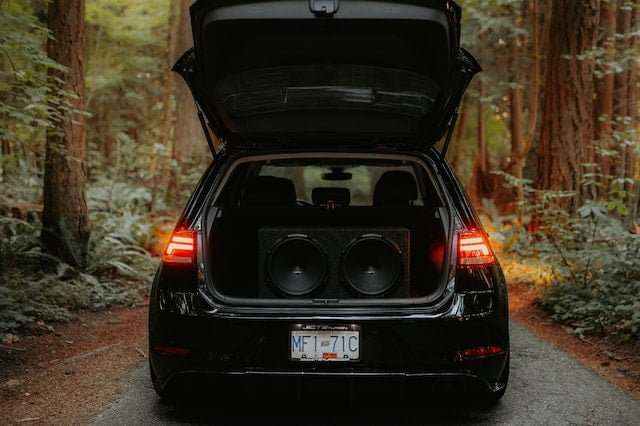Crackling car speakers can be very annoying and infuriating. The unwanted crackling noises can significantly hamper your audio experience and ruin your immersive ness while driving.
If you are experiencing crackling noise from your car speakers, then this article is definitely for you. In this article, I will share some practical solutions to this issue.
I will also share some tips for maintaining your car speakers so that you don’t get into this problem in the first place. So without further ado, let’s get into it.
1. Check the speaker connections
The first step in resolving crackling car speakers is to ensure that speaker connections are secure. Start by examining the wiring connections behind each of your speakers. Look for any loose or frayed wires. If you find any, make sure they are correctly attached to the speaker terminals.
Loose connections can cause intermittent electrical flow, resulting in crackling sounds. If you find any issues, reconnect the wires properly or replace the damaged wires.
2. Inspect the speaker cone
A damaged or deteriorating speaker cone can also contribute to cracking sounds. Carefully examine each speaker cone for visible signs of wear, tears, and cracks. These imperfections can lead to distortion in sound reproductions resulting in crackling noises.
You may have to replace the speaker cone if you find any defects. Refer to your vehicle’s user manual or seek advice from a professional technician to receive guidance and obtain the correct replacement parts.
3. Clean the speaker grills
Dust, debris, and small particles can accumulate on the speaker grilles over time. This build-up can interfere with the speaker’s performance and result in producing crackling sounds.
To address this issue, gently clean the speaker grills using a soft cloth or small brush. Be careful not to put too much pressure on the grill while cleaning; otherwise, you might end up damaging your speaker cones.
4. Check the amplifier
Sometimes, a defective or malfunctioning amplifier can be the root cause of causing crackling noise. Inspect the amplifier’s wiring and connections to ensure that they are secure and properly connected.
Loose or faulty amplifier connections can lead to an irregular power supply to the speakers, leading to sound distortion. If you suspect an issue with the amplifier, consult a professional audio technician for a thorough inspection and repair.
5. Check Your audio source
The crackling sound may not always originate from a hardware issue. Poor-quality audio files or damaged CDs may also be responsible for producing crackling or popping sounds when played.
Try playing from a different audio source and change the audio file to determine whether the issue lies with the audio source.
6. Adjust the equalizer settings
An improperly adjusted equalizer can introduce distortion and crackle to your audio output. Examine the equalizer settings on your car stereo system and ensure they are properly balanced.
Resetting the equalizer settings to the default values can help reduce the crackling caused by misconfiguration. Ensure that the equalizer settings are set by the type of music you are listening to, as improper adjustment can lead to audio distortion.
7. Seek professional assistance
If you have tried all the fixes mentioned above and the crackling issue persists, it may be time to seek professional assistance. Professional technicians have specialized tools and expertise to diagnose and repair the problem with your speaker.
They can pinpoint the underlying problem and recommend the most appropriate course of action by conducting advanced tests such as impedance measurement or signal analysis.
Although seeking professional help can sometimes turn out to be expensive, in the end, you will save yourself a lot of time and hassle.
How do you maintain your car speakers?
Now that you know how to fix your car’s crackling speakers, it is time to know how exactly you maintain them. Follow the guidelines below to keep your speakers in good condition and get the most out of them.
1. Keep the surroundings clean
Dust, dirt, and debris can accumulate on and around your car speakers, negatively affecting their performance. Regularly clean the speaker grilles with a soft cloth or a brush to avoid debris buildup.
Moreover, also try to keep the interior of your car clean to minimize the chances of dust and dirt entering the speakers.
2. Avoid moisture
Moisture is the number one enemy of your car speakers as it can cause internal corrosion and damage the sensitive components. To prevent moisture-related issues, avoid leaving your car windows open during rain. Also, avoid keeping the windows down while washing your car.
If you live in a humid environment, consider using moisture-absorbing products like silica gel packs to minimize the moisture level inside your car.
3. Monitor volume and bass levels
Too much volume and bass levels can put excessive strain on your car speakers, leading to distortion and potentially causing permanent damage. Be mindful of the volume levels and avoid constantly playing music at the max volume.
It is advised to periodically check and adjust the balance and fade settings to ensure an even distribution of sound throughout your vehicle.
4. Inspect wiring and connections regularly
If you want your car speakers to last long, you must inspect the speaker wiring and connections regularly. Check for loose or frayed wires, corrosions, or loose connections at the speaker terminals or amplifiers.
If you encounter any issues, address them by reconnecting or replacing the faulty wires. Moreover, make sure that the wires are properly insulated to prevent unnecessary interference.
5. Protect speakers from extreme temperatures
Extreme temperatures, be it hot or cold, can negatively influence the performance and longevity of your car speakers. Prolonged exposure to high heat can cause damage to the speaker components while freezing temperatures can affect their flexibility and audio reproduction.
Park your car in shaded areas to minimize heat exposure whenever possible. You can also use window sheds to protect the interior from direct sunlight and overheating.
During cold weather, allow your car’s heating system to warm up the cabin before playing audio to avoid subjecting the speakers to sudden temperature changes.
Conclusion
Crackling car speakers can be a frustrating problem, but with a systematic approach, you can troubleshoot and fix the issue. Moreover, you can avoid crackling speaker issues altogether by regularly maintaining and taking proper care of them.
By following the tips mentioned in this article, you can easily and effectively address the causes of crackling sounds and make your time on the road even more enjoyable.
Featured Photo by Luke Miller
You might also like,

